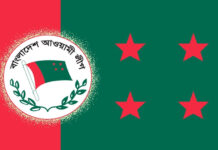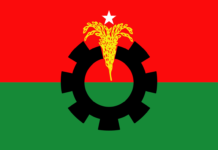Khaleda tells NY Times she may consider leaving Islamist party
For the first time since the formation of the four-party alliance (now the 18-party alliance) in 1998, BNP Chairperson Khaleda Zia has hinted that her party might consider cutting off political ties with Jamaat-e-Islami.
In an interview with the New York Times on Monday night, Khaleda said: “With Jamaat, it’s not a permanent alliance.” When asked whether she could end the alliance, she said: “At this moment, I cannot, but when the time will come I will see.”
In the post-election press briefing earlier that day, Prime Minister Sheikh Hasina said she would welcome the BNP to a dialogue, provided that the party stopped “violence” and abandoned “militant” Jamaat. “No constructive discussion is possible as long as the Jamaat is on its [BNP’s] shoulders.”
In another interview on Monday, this time with the BBC Bangla Service, Khaleda shot back at the PM saying: “She [the PM] cannot dictate. She was with Jamaat. She assumed the office along with Jamaat. We will not run the party as per her dictation. We are an independent party. So we will run in our way.”
When contacted none in the BNP was ready to go on record and make any comment on the issue. But some of the policymakers, who preferred not to be named, told the Dhaka Tribune that they were not comfortable with Jamaat in their alliance, especially after the verdicts of the war crimes trials and recent violence.
They said the issue of dropping Jamaat was discussed in some informal meetings, but they could not reach to a decision.
Former Dhaka University vice-chancellor Professor Emajuddin Ahmed told the Dhaka Tribune that the BNP could still maintain a liaison with Jamaat because it had not been banned as yet.
“However, a time may come when the BNP may think that it will not need Jamaat anymore. But now is not the time to say anything about that,” said Prof Emajuddin, who has close links with BNP.
“Then again, the proposal to cut ties with any party is not of good taste. Neither will it be pleasant if any party implements that proposal,” he said.
Jamaat, a key component of the opposition alliance, has always played an important role – mostly violent – in intensifying street protests during the ongoing tenure of the Awami League-led government.
The right wing party, accused of committing war crimes in 1971, has also been largely blamed for the violent street protests and the loss of property and lives in the months preceding the January 5 elections.
BNP sources said in many districts such as Bogra, taking advantage of BNP’s organisational weaknesses, Jamaat got onto the driving seat which gave rise to reigns of terror, especially after the International Crimes Tribunal started pronouncing sentences against its leaders for war crimes.
On August 1 last year, the High Court declared Jamaat’s registration as a political party with the Election Commission illegal. Jamaat got a conditional registration with the EC during the tenure of the army-backed caretaker government, after it brought massive amendments to its party charter to meet some of the registration requirements.
Although they have never said anything in public, a number of BNP leaders are against maintaining the political liaison with Jamaat.
In 1991, after the dethronement of military ruler HM Ershad, the BNP formed a government with the support from Jamaat, which did not take any share of power.
During that time many MPs belonging to BNP made demands in the parliament to ban Jamaat following countrywide clashes between their student fronts – Chhatra Dal and Islami Chhatra Shibir. The clashes took the lives of a number of Chhatra Dal activists.
Jamaat, along with all other religion-based political parties, was banned after Bangabandhu’s government took over in 1972.
After Bangabandhu’s assassination, Jamaat re-emerged in 1976 on a new platform called the Islamic Democratic League (IDL), which participated in 1979 parliamentary elections.
According to Jamaat leader Abdur Razzak, the IDL was a political front of Jamaat in the 1979 elections, as the party then was just an Islamist organisation.
Jamaat-e-Islami Bangladesh (later renamed Bangladesh Jamaat-e-Islami) was officially founded at a convention, chaired by its acting ameer the late Abbas Ali Khan, at Hotel Eden in Dhaka on May 25, 1979.
In 1994, Jamaat joined the Awami League and Ershad’s Jatiya Party in a movement pressing the then BNP government to install the non-party caretaker government system – a formula that Jamaat coined in the early 1980s when the anti-Ershad movement began.
In the late 1990s, Jamaat joined BNP in the four-party alliance which ended up winning a huge majority in the 2001 elections, and the Islamist party became an integral part of Khaleda Zia’s government and the alliance led by her.
In 2008, Jamaat won only two seats in the 9th national elections in which the winning Awami League pledged to try the war criminals, most of whom are Jamaat top brass.
Nine senior Jamaat leaders, including its chief and secretary general, are currently either facing trial or convicted for committing crimes against humanity during the 1971 Liberation War.
Jamaat’s assistant secretary general Abdul Quader Molla was executed in December last year after being convicted of war crimes.
Source: Dhaka Tribune










